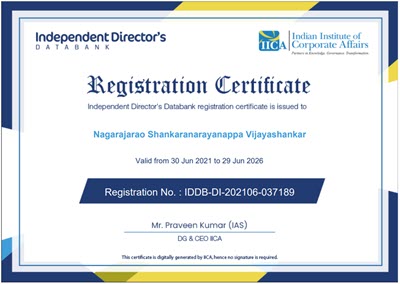
Get Ready to be a Certified DPO and Data Auditor from FDPPI/Cyber Law College
Naavi’s Cyber Law College has just completed the first batch of CDPP-Module I as a 4 day week twelve hour program. The program is a one of its kind program which combined Privacy and Data Protection from DPDPA 2023 as well as ITA 2000.
A new module on Audit called Module A will start in October towards the third week as a week end program (3 hours per day probably for a total of 12 hours). This will again be one of its kind program which will cover different frameworks including ISO 27701, BIS’s Adequacy of Data Governance and Management Standard and the FDPPI’s Data Governance and Protection Standard of India (DGPSI).
For those of you who missed the last Module I, and have to go through Module G before they take up Module A to complete the three parts leading to C.DPO.DA, which will be a coveted certification with registration in the Indian National Register of DPOs and membership of FDPPI, we are leaving another month before we start Module A.
Those who are interested should immediately start taking the course on Recorded mode and use the mentoring sessions in between as and when required where they can interact with our faculty.
Opportunities fly past, One has to be alert to catch them before they pass by….
Naavi
Personal Data Processed by Automobile Pollution Control Certification Agents

Yesterday I took my vehicle for a Pollution control certificate to one agent X. I had not used him on earlier occasions and had been getting such certificates with others.
The moment he read my number plate on the computer, he quoted my name and mobile number.
This means that the vehicle number is in the data base along with the owner’s name and mobile number and accessible by all such PUC agents in every petrol bunk. The same data should be available to toll gates and any other CCTV camera that scans the vehicle number plate.
I agree that it can be processed for any law enforcement purpose.
However there is a need to ponder whether consequent to DPDPA 2023, the PUC agents are to be considered as “Data Fiduciaries” and certain obligations are to be imposed on them?
As regards the Toll managers who are private agencies and not law enforcement agencies, they may be considered as “Significant Data Fiduciaries” since they process lakhs of personal data each day with or without the financial information through fast tag.
There should therefore be a DPO for NICE or other toll managers.
Alternatively the systems of fast tag reading and CCTV should be modified to ensure that the data is not available automatically for analysis .
A thought is required on this.
Naavi
“Privacy Pitamaha” title conferred on Justice (Rtd) K S Puttaswamy
Justice (Retd) Sri K.S. Puttaswamy, the person who initiated the Supreme Court petition on Privacy which finally ended up with the judgement on August 27, 2017 that Privacy is a Fundamental Right in India, is today 98 years old and lives a quiet life in Bengaluru. At a time when the industry is celebrating the advent of the new law, we considered it necessary to recognize the man behind this watershed moment in India.
Accordingly the Board of FDPPI passed a resolution that we should confer a title “Privacy Pitamaha” on him and today called on him at his residence to convey it to him through a simple meeting. Dr Avinash, Dean of of Manipal Law School joined FDPPI on this occasion to support the initiative.
We feel a sense of satisfaction that the contribution of this senior citizen who created history in India was recognized by FDPPI. We feel honoured by honouring him.





Is Indian Express guilty of Privacy infringement under DPDPA and ITA 2000?…DPDPA is here…4
It has become a practice for organizations to send marketing e-mails with “Donot Reply” address. Today I came across the following email from Newsletter@indianexpressonline.org but the reply set to a non existent email address of emailers@indianexpressonline.org. Obviously the “Reply to” message bounced.

The Email was delivered through the AWS service namely Amazon Simple Email Service

Consequent to the DPDPA being a law in India, we need to debate the ethical and legal aspect of such emails.
Does this email of Indian Express constitute a communication without an appropriate notice and Consent? May be Indian Express may today say that the date of effectiveness of the provision of Section 5 of DPDPA is not yet announced.
But, could this also be considered as “Impersonation” and an attempted Section 66C -ITA 2000 offence? ..which is a cognizable offence with 3 year’s imprisonment?
To me it appears to be so.
Next, what is the role of Amazon SES which is the instrument of this crime? Is it to be considered as a “Data Processor” and an “Agent” so that the liability for impersonation and attempted impersonation lies only with Indian Express and not Amazon? or is Amazon a joint Data Fiduciary and has a liability under DPDPA while escaping liability under ITA 2000 where it is an undisclosed agent?
My view is that both Indian Express and Amazon are guilty of Section 66C offence of ITA 2000 which is effective today and also liable under Section 5 of DPDPA for which a penalty of upto Rs 250 crores could be imposed? …if DPB had been in existence?
Let’s Debate.
Comments are welcome
Naavi
Now FDPPI’s Framework becomes more valuable

FDPPI had introduced an implementation and Certifiable audit framework for Data Privacy in the name of PDPCSI (Personal Data Protection Compliance Standard of India). This framework created by Naavi was meant to assist the organizations towards compliance of the data protection laws in India.
Initially PDPCSI was made compatible with PDPB 2019 and then to DPDPB 2022 and now DPDPA 2023. Since Naavi has always been holding that ITA 2000/8 is the operative data protection law of India even before DPDPA 2023 became the law, principles of ITA 2000/8 compliance have been integrated with PDPCSI and the framework was also referred to as DPCSI (Data Protection Compliance Standard of India). Under DPCSI, data was classified as Personal and Non Personal and DPDPA was applied for Personal Data and ITA 2000/8 for non personal data.
Now even after removal of Section 43A from ITA 2000/8, ITA 2000 continues to be part of Personal Data Protection regime for various other reasons. Hence the present PDPCSI takes into account the ITA 2000/8 to the extent it applies to Personal Data. In this aspect sections like Section 72A, 43,65,66,66C,66D,67C,69,69A,69B,70B etc are considered applicable to Personal Data Protection also. Hence the PDPCSI-2023 already amalgamated compliance of ITA 2000 with DPDPA2023. The Non Personal Data after classification was being treated separately as ITA 2000/8 compliance issue.
Naavi had introduced a framework titled IISF 309 (Indian Information Security Standard) to meet the requirements of compliance of ITA 2000/8 though many organizations preferred to use ISO 27001 for the same purpose.
Now with the release of a draft Standard by BIS for Adequacy of Organizational Data Governance & Management Practices which includes under Risk Management domain, the scenario of framework needs to be reviewed.
This suggested standard requires that the organization must have a defined privacy policy that defines all data that is to be considered as personal data. It must describe how each type of personal data will be collected, processed and stored. In particular the framework for obtaining consent for collecting, processing and storage of personal data and the acceptable methods for protecting such data throughout its lifecycle should be clearly described.
The outcomes expected are
a) Availability of a documented privacy policy and consent management framework
b) Standardized process to assess whether information is PII and categorize PII based on associated privacy risks.
c) Limits the collection of PII to the minimum elements identified for the purposes described in the notice
d) Retention of PII for which the individual has provided consent
e) Compliance with privacy requirements
f) Management of privacy risks as part of managing the enterprise risk management function
In view of this we can say that this standard includes all requirements of Privacy Protection into this standard.
The standard also speaks of Data Regulatory compliance and hence includes DPDPA compliance as well as ITA 2000/8 compliance as part of this standard.
But this is not the ISO 27701 replacement but considers more of the Managerial responsibilities of Data Governance.
Hence this framework is in close alignment with FDPPI’s PDPCSI which has 30 of its 50 model implementation specifications dedicated to the Management, the DPO, the Legal and HR responsibility centers.
The current PDPCSI therefore is the existing framework which completely is in compliance with the new proposed BIS standard.
In FDPPI trainings on the Audit Module, more details of how PDPCSI can integrate with this new standard would be discussed. Further FDPPI is considering merging the PDPCSI and DPCSI into a larger canvas of “Data Governance and Protection Standard of India” (DGPSI) which covers both Governance of Data as well as Protection of Data.
Henceforth companies in India can consider only FDPPI’s DGPSI as the Corporate Data Management standard and the IT system they develop on the basis of DGPSI which may be called DGPMS (Data Governance and Protection Management System) which will be audited by the certified auditors of FDPPI.
This is the future of Data Protection Audit in India. This is the reason why we stated yesterday that Data Protection Professionals are seeing another new and exciting development.
Now Forget all other frameworks and focus on FDPPI’s DGPSI.
Naavi









